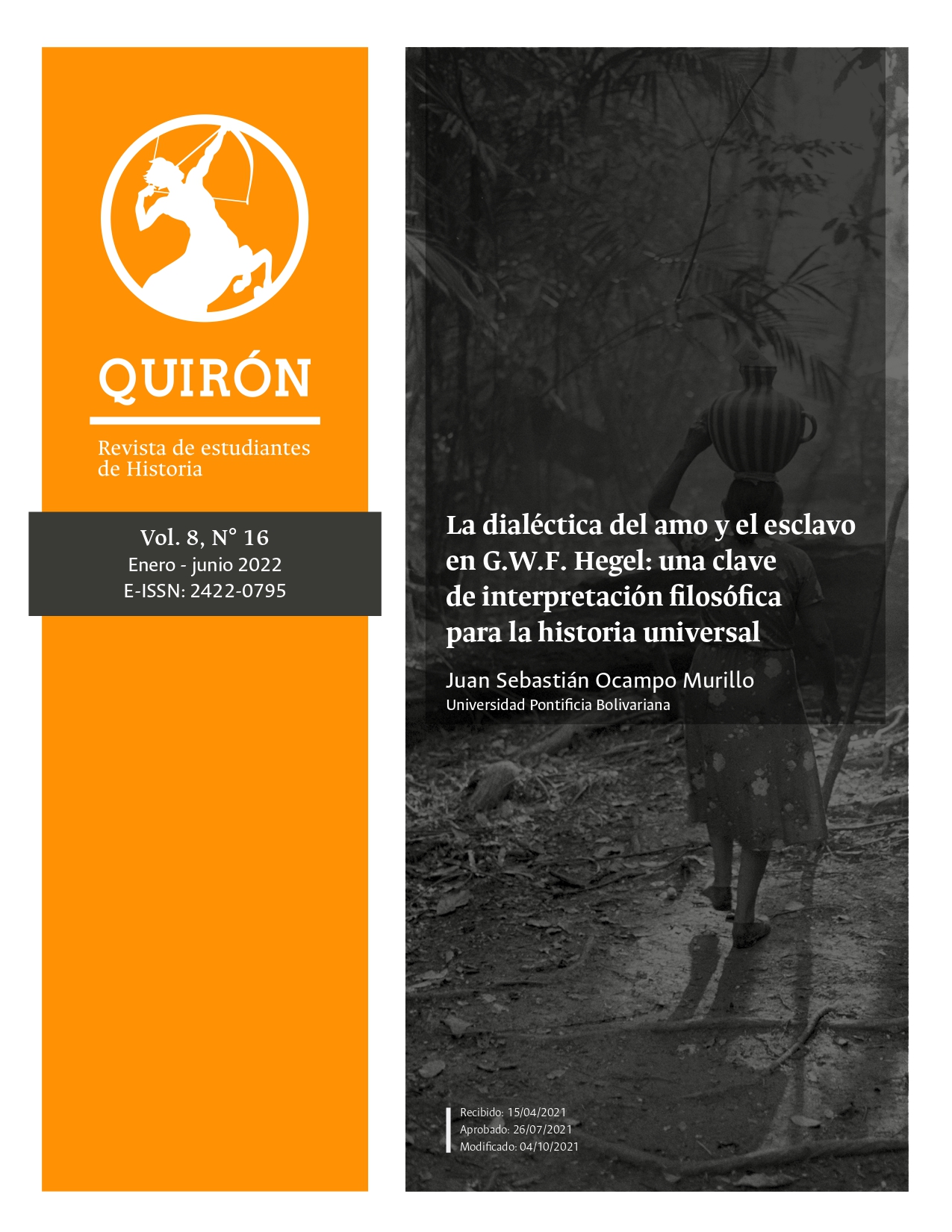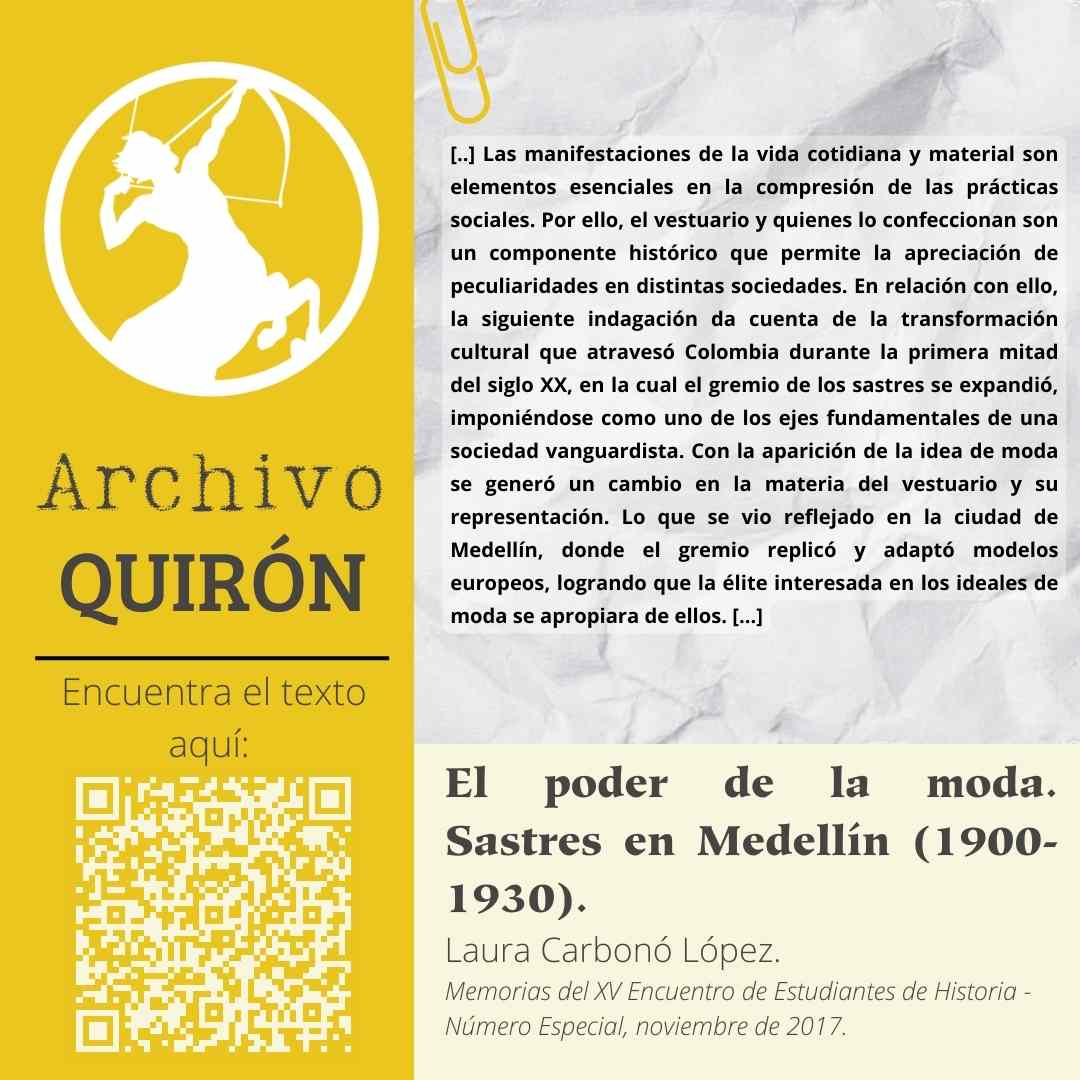The Master-slave dialectic in G.F.W Hegel: a key of philosophical interpretation for universal history
Keywords:
dialectic, history, master and slave, struggle, recognition, tragedyAbstract
In the following article, the philosophical figure of the master slave dialectic within the work of G.W.F. Hegel will be analyzed. Likewise, this paper will focus on the relevance of this theoretical narrative around the struggle and recognition when facing various problems in the historian’s discipline. It will proceed by elucidating how Hegel gave the study of history a place of prominence for the construction of his philosophical system, and, in the same way, it will be shown how this author can provide enlightenments for the historical discipline. In the first place, it will approach ancient skepticism and its relationship with Hegel; later, it will fully enter into the dialectic of the master and the slave, and, finally, an exhaustive study will be made on the figure of the tragic hero and its importance for the constitution of laws, customs and social regulations.
References
Adorno, Theodor y Horkheimer, Max. Dialéctica de la Ilustración. Madrid: Editorial Trotta, 1968.
Álvarez, Eduardo. El saber del hombre. Una introducción al pensamiento de Hegel. Ediciones de la Universidad Industrial de Santander, 2015.
De Vries, William A. Hegel’s Theory of Mental Activity. Londres: Imprenta de la Universidad de Cornell, 1988.
Elías, Norbert. El proceso de la civilización. Investigación sociogenéticas y psicogenéticas. Ciudad de México: Fondo de Cultura Económico, 1975.
Engels, Friederich. Ludwig Feuerbach und der Ausgang der klassischen deutschen Philosophie. Stuttgart: Verlag Von J.H.W. Dietz, 1888.
Fink, Eugen. Interpretaciones fenomenológicas de la Fenomenología del espíritu. Barcelona: Editorial Herder, 2011.
Fichte, Johann Gotlieb. Sobre la lingüística y el origen de la lengua. Madrid: Editorial Tecnos, 1996.
Hegel, G.W.F. Fenomenología del Espíritu. Ciudad de México: Fondo de Cultura Económica, 1966.
Hegel, G.W.F. Fenomenología del espíritu. Madrid: Editorial Pre-textos. 2010.
Hegel, G.W.F. Lecciones sobre la estética. Madrid: Akal, 1989.
Hyppolite, Jean. Génesis y estructura de la Fenomenología del espíritu de Hegel. Barcelona: Ediciones Península, 1973.
Kojéve, Alexandre. La dialéctica del amo y el esclavo en Hegel. Buenos Aires: Editorial La Pléyade, 1982.
Küng, Hans. La encarnación de Dios. Introducción al pensamiento de Hegel como prolegómenos para una cristología futura. Barcelona: Editorial Herder, 1974.
Leontyev, Aleksei Nikolaevich. Activity and consciousness. Pacífica: Marxist Archive, 2009.
Lefebvre, Henri. Lógica formal, lógica dialéctica. Ciudad de México: Editorial Siglo XXI, 1983.
Lenin, Vladimir. Materialismo y empirio-criticismo. Moscú: Editorial Progreso, 1948.
Marchetti, Igor y Koster, Ernst, H.W. “Brain and intersubjectivity: a Hegelian hypothesis on the selfother neurodynamics”. Front Hum Neurosci 8, n.º 11 (2014): 6-14. https://doi.org/10.3389/ fnhum.2014.00011
Marx, Karl. 18 Brumario de Luis Bonaparte. Madrid: Fundación Federico Engels, 2003.
Magee, Glenn Alexander. The Hegel dictionary, India: Replika Press, 2010.
Nagel, Thomas. La mente y el cosmos. Por qué la concepción neodarwinista materialista de la naturaleza es, casi con certeza, falsa. Zaragoza: Titivillus, 2012.
Platón. Parménides. Madrid: Editorial Gredos, 1988.
Rubinstein, Sergei. El ser y la conciencia. Ciudad de México: Editorial Grijalbo, 1968.
Rosental, Mark Moisevich. Las categorías del materialismo dialéctico. Ciudad de México: Editorial Grijalbo, 1960.
Sexto Empírico. Esbozos pirrónicos. Madrid: Editorial Gredos, 1993.
Valls Plana, Ramón. Del yo al nosotros. Barcelona: Editorial Laia, 1979.
Voloshinov, Valentín. El marxismo y la filosofía del lenguaje. Buenos Aires: Ediciones Godot, 2009.
Vygotsky, Lev. Psicología y pedagogía. Madrid: Editorial AKAL, 2011.
Zizek, Slavoj. Menos que nada. Hegel y la sombra del materialismo dialéctico. Madrid: Editorial AKAL, 2018.

Published
Issue
Section

This work is licensed under a Creative Commons Attribution-NonCommercial-NoDerivatives 4.0 International License.







